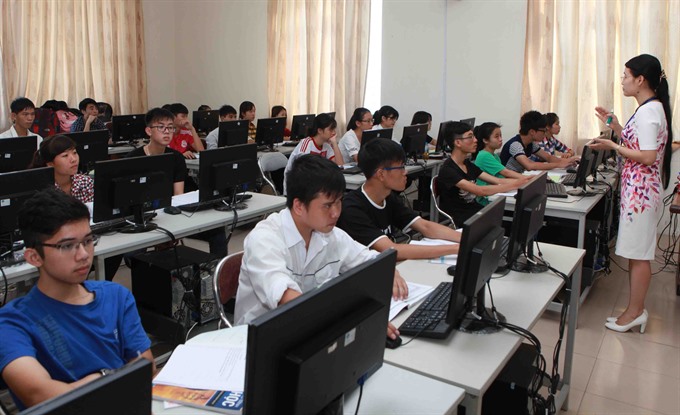 Society
Society

A large number of university lecturers in Việt Nam are not qualified with their academic degree under standard, statistics recently released by Ministry of Education and Training revealed.
 |
| A computing class at Hải Phòng Medicines and Pharmacy University. Many universities in Việt Nam are said to face a shortage of qualified lecturers. — VNA/VNS Photo Quý Trung |
HÀ NỘI - Many university lecturers in Việt Nam are not qualified as they hold below standard degrees, statistics recently released by Ministry of Education and Training revealed.
The Law on Higher Education which took effect in 2012 requires university-level lecturers to have master’s degrees or degrees of higher education except for specific majors. However, according to the Ministry of Education and Training, at many universities, about half of the permanent lecturers hold bachelor’s degrees.
This includes Võ Trường Toản University, a public tertiary educational institute in Mekong Delta Province of Hậu Giang. More than 64 per cent of its permanent lecturers hold bachelor’s degrees.
Nguyễn Tất Thành University of Việt Nam Textile Corporation in HCM City has 45 per cent of its permanent lecturers holding bachelor’s degrees. Only 10 per cent hold master’s degrees. The figure for Trà Vinh University is 37 per cent.
As many as 126 out of 276 permanent lecturers employed by Hà Nội Industrial Textile Garment University hold bachelor’s degree.
Many universities have certified these lecturers even though they fail to meet standards of lecturers’ quality.
Trần Ái Cầm, deputy director of Nguyễn Tất Thành University told Thanh Niên (Young People) newspaper that besides university level, the school also offers training at college level. More than 500 lecturers holding bachelor’s degrees are teaching at college level. Only lecturers with master’s degrees or higher are allowed to teach at university level, he said.
In fact, only 14 per cent of students of Nguyễn Tất Thành University are trained at college level. In 2017, the university did not recruit any students at college level.
Associate Professor Nguyễn Xuân Hoàn, vice principal of Food Industry University in HCM City said that 130 bachelor-holding lecturers of the university teach college students.
“From now until 2020, the university will stop college-level recruitment. Bachelor-holding lecturers who do not learn to gain higher degree will have to change their position or leave job. It is impossible to have bachelor’s degree holders teach university students,” he said.
A representative of Phạm Ngọc Thạch Medical University said the university is standardising lecturer recruitment. Some who don’t have master’s degree are newly-recruited or have been lecturing for a long time.
Associate Professor Nguyễn Hội Nghĩa, director of education quality verification of HCM City’s National University said that the universities have many reasons to explain the shortage of qualified lecturers. Some explained that permanent staff members are teaching assistants, not lecturers or they are only in charge of a laboratory, not teaching.
Others claimed that it is hard for some majors to recruit high-quality teachers.
Nghĩa said that this fact is hard to accept and will affect the quality of tertiary education.
“The State has clear standards but universities have not followed them,” he said.
According to experts, while the number of new majors and new universities keeps rising, the number of qualified teachers trained every year cannot meet demand. This has led to bachelor holders teaching university students.
“The Ministry of Education and Training must manage universities to stop the size of training increasing so fast that the number of qualified lecturers does not keep up with this increase,” Nghĩa said. — VNS




